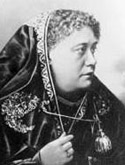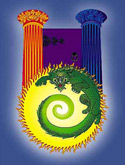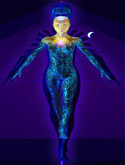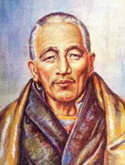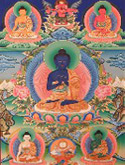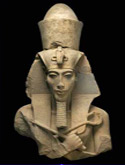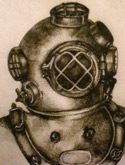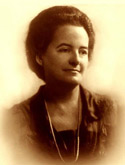Friedrich Nietzsche – Philosopher: (1844-1890) October 15, 1844, Rocken, Germany, 10:00 AM, LMT.
(Source: Sabian Symbols), died August 25, 1900, Weimar, Germany.
(Ascendant the last degree of Scorpio; MC, Virgo with Mars in Virgo conjunct the MC; Venus is also in Virgo, conjunct Chiron; Moon rising in Sagittarius; Mercury in Libra widely conjunct Mars; Jupiter in Pisces conjunct IC, widely conjunct Uranus in Aries; Saturn in Aquarius; Neptune in Aquarius; Pluto in Aries exactly opposed the Sun)
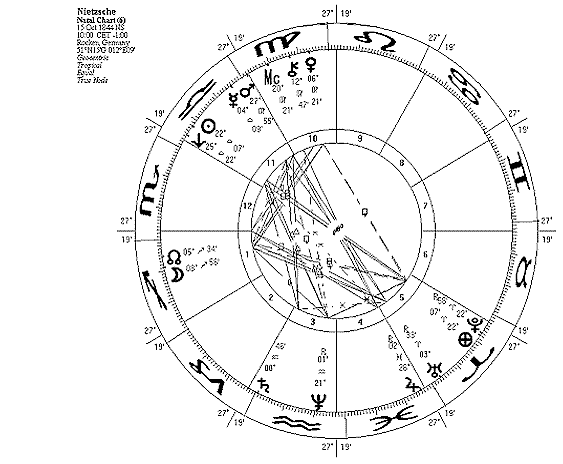
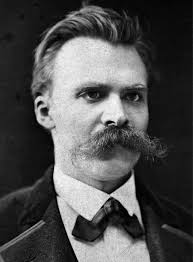 It can be questioned, if the Ascending degree in Scorpio is so close to Sagittarius (and the time of birth so apparently rounded off), why might the Ascendant as well not be Sagittarius. In response to this possibility, it would seem that the very evident Sagittarian energies in Nietzsche’s life are well covered by the afflicted Sagittarian Moon.
It can be questioned, if the Ascending degree in Scorpio is so close to Sagittarius (and the time of birth so apparently rounded off), why might the Ascendant as well not be Sagittarius. In response to this possibility, it would seem that the very evident Sagittarian energies in Nietzsche’s life are well covered by the afflicted Sagittarian Moon.
Many other factors in his life, however, demand (if they are to be understood) the potent presence of Scorpio and hence, the enhancement of the power of Pluto. The birth could have been a little earlier and only a mere three minutes later (before the change into Sagittarius), but Scorpio as an Ascendant will have to be preserved if Nietzsche’s character and the deeper meaning of his life are to be revealed.
Friedrich Nietzsche was the most influential German Philosopher since Kant and Hegel. He was , as well, a classical scholar, philosopher, and critic of culture who became one of the most brilliant (the stars Arcturus and Spica conjunct the Sun) and influential of all modern thinkers. His attempts to unmask the motives (the last and critical degree of Scorpio Ascending) that underlie traditional Western religion, morality, and philosophy deeply affected generations of theologians, philosophers, psychologists, poets, novelists, and playwrights.
Nietzsche was not a systematic philosopher (third ray) but rather a moralist (sixth ray) who passionately (sixth ray) rejected (first ray) Western bourgeois civilization. He regarded Christian civilization as decadent (Scorpionic sensitivity to morbidity), and in place of its “slave morality” he looked to the superman, the creator of a new heroic morality that would consciously affirm life (first ray) and its highest values. That superman would represent the highest passion (sixth ray) and creativity (fourth ray) and would live at a level of experience beyond the conventional standards of good and evil. His creative “will to power” (first ray) would set him off from “the herd” of inferior humanity. A high note of idealism and perfectionism rings through these thoughts, and a will to transcend the stultification and corruption of normal life.
Nietzsche was a brilliant and respected philologist, and taught classes in classical philology until 1879, but he longed for far greater expression. Freeing himself from his onerous academic responsibilities, he spent the next ten years in loneliness, writing his major works, including Thus Spake Zarathustra, and Twilight of the Gods. He became insane in 1889; probably due to the effects of latent syphilis, and spent the next eleven years in complete mental darkness until he died on August 25th, 1900.
According to the Tibetan, “the genius of Germany has often in the past been expressed along the line of its fourth ray soul, and through its power Germany has given much of music and philosophy to mankind.” (DN 58) Nietzsche’s rays are not those usually found in the foremost representatives of Western Philosophy (the third, fifth and second rays). The above quotation from The Destiny of the Nations makes it clear that philosophy can also be found upon the fourth Ray of Harmony Through Conflict, in which case it will not be especially systematic or cogently logical, but, instead, will be rooted in dialectic and conflict and will attempt to utilize the intuition to reconcile the warring opposites-or it will emphasize, in an unbalanced manner, one pole over another. Both such approaches were characteristic of Nietzsche’s thought.
It is reasonable to think of Friedrich Nietzsche as possessed of a fourth ray soul, a sixth ray personality, and a first ray mind (with a strong and acute Libran Mercury {the hierarchical ruler of his Scorpio Ascendant} conjunct a Virgoan Mars adding to the sharpness of his mind), probably a sixth ray astral vehicle strongly influenced by the fourth ray, and a rather seventh ray etheric/physical vehicle.
When looking for the conduits and reinforcements for some of these important rays, we find the Scorpio Ascendant transmitting the fourth ray, and the fourth ray Moon placed in Sagittarius, which sign is also a partial conduit for the fourth ray. Mercury, a planet which powerfully transmits the fourth ray is elevated in the tenth house, and placed in Libra (a sign which, though not given as transmitting the fourth ray, has many ambivalent characteristics suggestive of the presence of this ray). In addition it is interesting to note that the proposed ephemeris for the undiscovered planet, Pan-Loki, places it in a close conjunction with the Moon. Pan is said to rule all manner of divisions. Niklas Nihlen, in his book, The Unseen Planets describes it in the following manner:
“Where there will be an identification of Cleavage, and, therefore, an urge to be made whole by the higher synthesizing aspect. The inter-relation of many energies, their fusion and their balancing, plus the final synthesis of two major energies, their fusion and their balancing.”
Pan-Loki, therefore, is clearly associated with the fourth ray, and thus with all manner of cleavages, the pain of those cleavages, and their reconciliation. Further channels for the fourth ray in Nietzsche’s birth chart are evident in abundance of significant oppositions-an astrological aspect associated with the contest between polarities and their possible reconciliation, fusing and blending. Pluto opposes the Sun; Uranus opposes Mercury; Jupiter opposes Mars.
Neptune, ruler of the fourth or buddhic plane should also be mentioned, for it closely trines the Sun and is placed in the third house which has so much to do with the mode in which mind perceives the world. Neptune in the fourth house enhanced the possibility of buddhic perception (when, in more ordinary cases, it does not simply lead to delusion). Nietzsche’s aesthetic sensitivity (associated with the fourth ray) was furthered by this placement.
If, as hypothesized, the soul were upon the fourth ray, Mercury (the main planetary conduit for the fourth ray) would become very important. It is in the prominent tenth house and conjunct the other major ruler of Scorpio, Mars. Nietzsche was known for his powerful (Mars/Mercury), sensitive (Libra) and highly critical (Virgo) mind. By means of this mind, he pursued his vocation (H10). Thus, the two rulers of Scorpio (on three levels-exoteric, esoteric and hierarchical) are not only conjuncted, and both of them conjunct the Virgo MC-Mercury through the expediency of what is called “translation of light”.
One might question, should the hierarchical ruler of the Ascendant be utilized in this instance, but for the disciple/initiate it is, in some cases, legitimate. Certainly , Nietzsche, for all his fourth ray instability, was an advanced soul, commanding the respect of some of the foremost thinkers of his age, and of decades to come. His Mercury (already important as the exoteric ruler of his Virgo MC) would be esoterically crucial in his chosen mission of seeing through cultural illusions. In Scorpio it is said: “Let Maya flourish and deception rule”. The buddhic function of Mercury associated with Scorpio, dispels illusion (Maya and deception), and would thus be crucially important to the fulfillment of his deeper esoteric calling. That it was placed in the sign Libra, gives it a potent evaluative function, providing illumination through the faculty of comparison.
When considering reinforcements for Nietzsche’s passionate sixth ray, we look first to the Sagittarian Moon, and then to the two planets placed in sixth ray Virgo (sixth ray Mars, and Venus-which, too, has its sixth ray component), and thence to Jupiter (a planet with some sixth ray vibrations) placed in Pisces-a sign which transmits both the sixth and second ray as does Virgo. Thus all the signs connected with the sixth ray (Virgo, Sagittarius and Pisces) hold important planets . The Moon is the esoteric ruler of the MC and, thus, a veil for either Neptune or Uranus.
In some ways it seems as if both were active. The Moon’s Neptune coloration would reinforce the sixth ray Sagittarian potential, making of Nietzsche a philosophical (Sagittarius) visionary (Neptune). The Uranian coloring of the Moon, justifiable because Nietzsche was an advanced soul, would add to his intellectual rebellion against conventional culture and reinforce his iconoclasm. When considering reinforcements for the first ray mind, we recognize that Mercury is conjunct critical Mars in Virgo (a sign containing the potency of first ray Vulcan). In addition, Mercury is ostensibly conjunct the undiscovered planet Morya (a potently first ray planet relating to being, Shamballa and the “Eye of God”). Further, Mercury receives a very close opposition and parallel from Uranus (a planet conveying the first ray from its monadic nature), and Uranus is placed in first ray Aries. Saturn (with its confirmed first ray component) trines Mercury from Aquarius.
As Nietzsche was certainly an initiate of some degree (probably the second), the esoteric ruler of his Libran Sun sign, Uranus, must be considered of importance. This potent Uranus, when related to his powerful Mercury, reinforces his vocation of social revolutionary. The normal ruler of the Sun sign is Venus (in Virgo), giving him an exacting refinement of taste, and conferring, to some extent, his musical abilities-for he was both a composer of songs (in early days) and an accomplished critic of fine music. Uranus, however, contributed to his role as arbiter of human values, based upon an entirely new and revolutionary perspective. Though Libra is, archetypally, the sign of peace, how could peace prevail in the presence of such dynamic, revolutionary and destructive aspects?
It was Nietzsche’s role first to destroy, and then assert; many critics do only the first. The destructiveness and potential regenerative urge of his life is signaled by the powerful Scorpio Ascendant (in Scorpio’s last and critical degree), and by the special ruler of Scorpio, Pluto in the first ray sign Aries, exactly (within a degree) opposed the Libran Sun. Aries is the only first ray sign in which the major planets are placed, but the two planets thus placed, Pluto and Uranus, are very significant in the chart, for, as stated, Pluto rules Scorpio, and Uranus (another partially first ray planet) is the esoteric ruler of Libra, Nietzsche’s Sun sign.
If we look at these two oppositions-Pluto opposed the Sun and Uranus opposed Mercury, we can see Nietzsche’s inherent attitude of rebellion. He could not be satisfied with things as they were. He was the iconoclast; the idols must be shattered, especially the “idols of the mind”. The fact that his Pisces IC is esoterically and hierarchically ruled by Pluto, adds to his power to undermine the foundation (IC) of cultural vision in decline, contributing to the psychological, philosophical and theological uncertainty, anxiety and moral relativism of the modern age. This Pluto would have been active in Nietzsche’s war against religious and philosophical absolutes.
If we look for the psychological roots of this rebellious criticism of conventionality, we will notice that Nietzsche’s early home was a stronghold of Lutheran piety, and that his upbringing was strictly Christian. The conventional and pious side of the sign Virgo was at work. Further, Virgo rules “women” in general and the “mother” in particular. It so happens that Nietzsche, after the age of five and the death of his father, was raised exclusively in the company of five women-his mother, his sister, his maternal grandmother and two maiden aunts. Hardly the atmosphere in which to cultivate thoughts of the “superman” -except through compensation!
It should be noted that the planet of wounding, Chiron, is found in Virgo, conjunct Venus (the planet, among other things, of the feminine) again in Virgo-the sign of woman and the mother. The midpoint of these two planets (Chiron and Venus) is square to the Moon (another ‘planetary’ indicator of the feminine) showing the difficult relations with women characteristic of Nietzsche’s life, and perhaps indicating why he should, through compensation, so much emphasize the strength of the masculine polarity and all that was Dionysian and anti-Christian (Christianity and its morality being easily interpreted as a ‘soft’ or feminine religion). Perhaps second ray Jupiter in the compassionate sign Pisces, conjunct the fourth house cusp of “home” indicates that Nietzsche was protected and sheltered too much by the attentive feminine element at home and longed to break free so that he could ‘breathe’.
Nietzsche rebelled against the inherent asceticism of declining Christian civilization. He railed against its implicit life-denial and nihilism. In fact he was protesting against his puritanical, well-behaved upbringing. His protest was passionate and unrelenting (sixth ray personality). In fact he even managed to lose his mind to a sexually transmitted, Scorpionic disease, syphilis. Nietzsche’s mastery of classical philology is reinforced by the trine between comparative Mercury in Libra and exacting Saturn in fifth ray Aquarius.
Further, his ascending degree is Scorpio is placed within the Cancerian (or backward looking) decanate. He had great respect for the glory of former civilizations and cultures which compared unfavorably with the sterility of contemporary culture. While Nietzsche may have begun his professional life as a philologist, this discipline could not forever contain the wild, creative fervor which seethed within his nature.
Breaking from this Saturnian, Mercurian discipline, he threw himself into the world of aesthetics (fourth ray) with the writing of his book The Birth of Tragedy from the Spirit of Music, in which he argued that Greek tragedy arose out of the fusion of what he termed Apollonian and Dionysian elements-the former representing measure, restraint, harmony, and the latter representing unbridled passion, -and that Socratic rationalism and optimism spelled the death of Greek tragedy. We can see him arguing here against rationalism (third and fifth rays), and for the Dionysian element (fourth and sixth rays). The final sections of this book extol Wagner and rhapsodize on the rebirth of tragedy from the spirit of Wagner’s music. In this literary effort we see the blending of the aesthetic fourth ray and the passionate sixth.
Nietzsche’s greatest literary contributions occurred during his years of withdrawal (1879-1889). Constant, serious ill health, semi-blindness and pain (note the many squares and oppositions in his chart), and his stultifying university work, forced him to withdraw from his teaching responsibilities, and instead, concentrate upon writing. During this time he published his philosophical and literary masterpiece, Thus Spake Zarathustra, Beyond Good and Evil, and the Genealogy of Morals.
It is important to note that from 1879-1881 (depending upon the accuracy of the 10:00 AM birth time), the progressed Sun had reached the last degrees of Scorpio, was crossing his late Scorpio Ascendant, and was moving into Sagittarius, during which time he offered the world his most prophetic and philosophically powerful work (prophecy and philosophy are both hallmarks of the Sagittarian energy).
The fact that the progressed Sun had come to the Ascendant and began its progress through the first house, demonstrates an alignment between the energy system of the personality and the will, light and power of the soul. Thus, these years were his most productive. As well, during the early part of this period, transiting Pluto (the reformer and regenerator–already opposing his Sun natally) was continuing to move in opposition to his progressing Sun (as, amazingly, it had since his birth) and was coming to a conjunction of the seventh house cusp. His destructive, regenerative influence on society (H7) would be at its greatest. We see that Nietzsche was, as it were, hunted by Pluto, one of his major ruling planets, so that the urge to destroy and resurrect never left him. He worked ever, its seems, under the “Shadow of Death”.
The year 1888 was Nietzsche’s final lucid year and witnessed a great outpouring (Jupiter) of his creative power. He wrote: The Case of Wagner; The Twilight of the Idols; The Anti-Christ; Nietzsche Against Wagner; and Ecce Homo. The main astrological correlation is transiting Jupiter crossing the Ascendant, entering Sagittarius (its own sign) and crossing the stellium of planets, asteroids and points to be found in the first house of Nietzsche’s chart-either natally or by progression. These planets included his natal Moon and progressed Sun and Mercury. After this brilliant period, insanity, apparently caused by syphilis, descended. The exact diagnosis was “atypical general paralysis caused by dormant tertiary syphilis”.
In January of 1889, Nietzsche collapsed in the streets of Turin. His chart shows transiting Uranus conjunct his natal Sun in Libra and opposing natal Pluto in Aries. Further, the Uranus transit was stationary and thus more powerful. Neptune (paralysis and insanity) was transiting conjunct his Descendent and in the same degree. During the next eleven or so years Nietzsche lived in a vegetative state in complete mental darkness, cared for variously by asylums, his mother and his sister. Among the diseases to which the various ray types are prone, fourth ray types can be the victims of insanities. (EH 51)
An analysis of Nietzsche’s work shows it falling into three stages. The first stage was characterized by a romantic perspective influenced by Schopenhaur and Wagner. Chart reinforcements for this period consist of the impulsive Sagittarian Moon widely trine natal Uranus in Aries, and the close trine between romantic Neptune (in the third house of mental perception) to the natal Libran Sun. This period saw the creation of such works as The Birth of Tragedy and Untimely Meditations.
The second or middle period extols reason and science and reflects Nietzsche’s emancipation from Romanticism. His works such as Human, All Too Human and The Gay Science are written somewhat in the style of the French Aphorists. Astrological reinforcements for this period emphasize Venus and Mars in Virgo and reasonable Mercury in a sign of rational consideration, Libra.
In his mature writings, Nietzsche was fundamentally interested in the origin and function of values. Here we see, especially, the importance of his Libran Sun, ruled by Venus in Virgo (a position of refinement), and his Mercury in Libra. Venus is the planet of values and Libra is the sign of evaluation and assessment.
That he was sharply critical of the values of Western Civilization may be laid to the power of Mars, the exoteric and esoteric ruler of his Scorpio Ascendant in the critical sign Virgo, conjunct Mercury, the exoteric ruler of Virgo, and in the very visible 10th house. The destructive power of Pluto, the ‘destroyer”, certainly adds to the potency of his criticism. Nietzsche’s greatest critiques were leveled against asceticism and “slave morality”.
He had no use for what we call the Christian virtues, and viewed them as a conspiracy by the weak (the slaves) against those who were naturally and rightfully powerful and masterful. In these thoughts we sense that Nietzsche is encouraging the rebellion of man’s instinctual, subterranean, Dionysian forces against the unitive, solar forces. Scorpio and Pluto are asserting themselves.
For Nietzsche, religious and philosophical absolutes (rooted in the ascetic world view) had dissolved. Though his personal life (lived strongly under the influence of Virgo, and much conditioned by the piety of those who raised him), was ascetic and largely abstracted from the expression of root instincts, in his writings he championed the opposite-competition, pride and autonomy-the unleashing of the natural strength of the individual, unfettered by the restrictions of the “slave morality” of the weak. One does not have to think too deeply to realize that Nietzsche was rebelling against the barely acknowledged perception of his own weakness.
Nietzsche was the victim of a subtle existential despair and viewed life as essentially and intrinsically meaningless-though not without value. Ordinary human beings invested circumstance with meaning because they (in their weakened moral and intellectual condition) could not tolerate the truth of a fundamental meaninglessness. From these views arose Nietzsche’s famous (and much misunderstood) dictum, “God is Dead”. For Nietzsche, religious and philosophical absolutes were dead, but there were truer values in need of passionate assertion.
Nietzsche attempted to replace nihilistic meaninglessness with several key concepts: perspectivism, eternal recurrence, the will to power and the superman. Perspectivism is a concept which holds that knowledge is always perspectival, that there are no immaculate perceptions, and that knowledge from no point of view is as incoherent a notion as seeing from no particular vantage point. One can relate this notion to two astrological factors-Sun and Mercury in Libra (a sign which evaluates from a given point of view), and the Sagittarian Moon, ever inclining towards the attainment of a vision. These are two signs much associated with the sense of perspective in both art and life. Libra (the sign of relationship) is necessarily associated with relativism. Things are evaluated depending upon one’s vantage point.
According to perspectivism, there is no all-inclusive perspective, which could contain all others and, hence, make reality available as it is in itself. If there is no omnipresent point of view (such as ‘God’ has been presumed to possess), the determination of reality becomes the task of the perspectivally-limited individual-the tiny human being asserting the value of his own perspectives. A great demand and burden fall upon the human consciousness. It would appear that this philosophy also grew out of a compensation for weakness, and a desire to prove one’s own potency, rather than attribute omnipotence, omniscience and omnipresence to an absolute deity.
The concept of the “will to power” runs counter to the ascetic ideal implicit in Western Civilization. This concept grows, to a degree, out of the Nietzsche’s first ray qualities, and is rooted especially in the Pluto/Sun opposition. Nietzsche believed, “all the supreme values of mankind lack this will-[and] that values which are symptomatic of decline, nihilistic values, are lording it under the holiest names.” Here again, it would seem that Nietzsche is doing battle with his own sense of personal impotence (the vulnerability of the fourth and sixth rays).
Nietzsche, who for so many years of his life, was subject to physical and psychological pain and suffering, repudiated the ascetic ideal of Western Civilization which he believed endorses existence as pain and suffering. Nietzsche, a man in whom the feminine virtues were pronounced (Libra planets and its ruler, Venus in Virgo) longed for a life of greater authority, dynamism and masculinity. Thus, he despised the apparent weakness of the Christian World View which demands the suppression of individual power and substitutes in its place, self-effacement for the sake of love, unity and harmonious human relations.
The concept of “eternal recurrence” is a distortion of the “Law of Periodicity” (an immeasurably more optimistic world view). The one who accepts the perspective of eternal recurrence believes that there will be, forever, an infinite repetition, without alteration, of each and every moment one lives. This concept is more than depressing, and Nietzsche on more than one occasion was nearly driven mad by its contemplation. Eternal recurrence is the worst kind of fatalism. It is born of a deep feeling of helplessness rooted in rigid determinism. Presumably, even one’s best and most heroic present efforts are but exact repetitions of an infinitude of identical efforts which have preceded them and which will follow.
This is a philosophy of despair and impotence, and it is difficult to understand how it could have lodged so fixedly in Nietzsche’s psyche-except that he loved tragedy. The lot of mankind under the doctrine of eternal recurrence was certainly, for the vast majority (including Nietzsche) tragic. According to Nietzsche, the only kind of person who would be strong enough to accept recurrence without self-deception or evasion would be a superhuman being (Übermensch), a superman, whose distance from the ordinary man is greater than the distance between man and ape.
Nietzsche was a brilliant, aesthetically gifted philosopher and acutely sensitive human being-whose life was a torture (fourth ray and sixth ray), both psychologically and physically. For students of the Ageless Wisdom, accustomed to considering discipleship and the life of the initiate in terms of the behavior common to certain rays (the first and second for instance), it may be difficult to recognize an advanced soul upon the fourth ray. The familiar characteristics may not present themselves, and much of negativity may obscure the soul qualities being expressed.
What could the soul be seeking to express in such a brilliant, posthumously influential and tortured life? Nietzsche was a great evaluator and critic of the illusions in which human society is immersed. Speaking in terms of the Ageless Wisdom, he longed for buddhic life beyond mind, for a life of potent and sublime experiences, untrammeled by the strictures imposed by pettiness and small-mindedness. He longed for some transcendent harmony beyond the sordidness and stupidity of the conventional life which confronted him. Thus, it was his task to evaluate, critique and pierce through the many illusions which prevented this higher, greater life, and then to destroy those illusions. Here we see the full spiritual power of the late Scorpio Ascendant and (ever-present) Pluto.
On some deep level, Nietzsche was an advocate of the life aspect-the first aspect of divinity, and its expression. Certainly he displayed the first ray (through aspects of his mind and, to an extent, through his isolative personality), but it would be hard to conceive of him as a first ray soul. What the quality of the monadic ray may be is difficult to determine, but the “will to power” (expressing itself through a sensitive energy system wracked with conflict) has to originate somewhere.
One might suggest this “will to power” was only compensation for real and perceived personal insufficiencies-for severely curtailed physical and emotional expression. Indeed, in Nietzsche’s life there were many compensations, but the power and beauty of Nietzsche’s writings (he was considered one of the great masters of German prose) might have a still deeper source. Perhaps it was his great frustration to be in touch with that tremendous, liberating spirit-potency and yet be unable to actualized it through his rather delicate personality instrument.
It might be said of Friedrich Nietzsche that he was born posthumously. He, himself, said that this was the fate of some important individuals. Great recognition came to him after his death, and he influenced a wide range of distinguished thinkers-philosophers, psychologists and theologians-all deeply indebted to his thought. Perhaps, after all, he was a true humanist (like so many notable German thinkers, a fourth ray soul). Perhaps his task was to remove an oppressive cultural emphasis upon “God-transcendent” and restore man’s faith in “God-immanent”-the power of the divine within, and thus man’s faith in himself.
It seems Nietzsche was a visionary, striving towards a state of consciousness which he was never entirely able to achieve. In this respect, it could be said that he failed in personal application. This failure may mean that he did not achieve the relative stability, illumination and deeply-seated joy characteristic of the third degree, but one must be careful not to judge too hastily the quality of the unrevealed interior states of exalted thinkers. Whatever may have been his initiatory status, his profound influence upon twentieth century thought (both for good and for ill) mark him out as a remarkable (if volatile) disciple, pointing the way to what he and others must one day become-real “supermen”. Do the Masters of the Wisdom demand of us any less?

